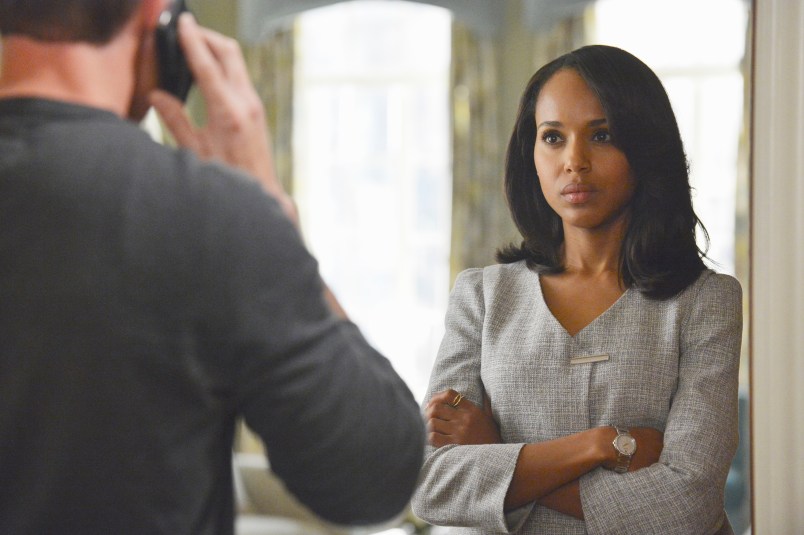This year’s Emmy’s proclaimed it a great time to be a woman on television. But the TV season ahead is showing signs of unraveling that progress. Women on the small screen are faced with a big question: do we get to follow our dreams?
As Julianna Margulies ascended the Emmy stage to accept her Best Actress award for The Good Wife, she triumphantly proclaimed, “What a great time to be a woman in television!” And in a sense, she’s absolutely correct. Women like her Alicia Florrick, Leslie Knope, Olivia Pope, and others are showing us that strong, successful, and beautiful women can exist on television as fully formed personalities.
Margulies’ view of the landscape differs sharply from Ann Hornaday’s bleak but unfortunately true assessment of women in film in the Washington Post:
You can be B.A., but . . . You need to be young, blessed with sci-fi superpowers or otherwise imaginary (blue or green skin helps — just ask Zoe Saldana). You can be faster and smarter and generally better than boys, but you’ll have to lose something in the bargain, preferably a cherished family member — or even the boy himself. Under no circumstances are you to grow into a recognizable adult with a job, career, family or other signifier of functional, if flawed, adulthood.
Regrettably, it would appear that two examples of this stunted view of women are traveling from the big screen to the small this fall.
After a big break in New York, Glee’s Rachel Berry was poised for stardom, achieving her dream of leaving sleepy little Lima, Ohio behind. But in a nod to his originally imagined ending for the show, Ryan Murphy has reportedly elected to have Rachel’s dreams crushed and return her to McKinley High’s New Directions, where she will direct the ragtag team of underdogs she railed so hard against for so long.
Elsewhere, in Pasadena, The Big Bang Theory’s Penny is rumored to be leaving acting after accepting the marriage proposal of her scientist boyfriend Leonard, a move that falls in line with her new mantra of “smart decisions.” While her move to the pharmaceutical industry will provide plot advancement vis-a-vis the confidence, self-esteem, and money she’ll bring to the relationship, at what cost?
This pair of plot twists for two beloved television characters flies would surely rankle Mary Richards of The Mary Tyler Moore Show, who its namesake famously fought to keep independent and successful as she had always wanted. By having both Rachel and Penny abandon dreams that were integral to their characters, they are buying into what Hornaday has called “structural sexism, a notoriously wimpy, risk-averse business model and a collective failure of imagination.” In recent years, television shows that center around men have featured them following and achieving their dreams (House of Cards, Mad Men, Scandal); these dreams often come at the expense of the dreams of the women who helped get them there.
For evidence of this divide, think of Claire Underwood’s abandoned foundation work, Betty Francis’ lost modeling career and eventual remarriage, and even Olivia Pope’s sacrifice to walk away from a relationship with the president. Conversely, shows that have been conceptualized around women feature them losing, missing or having lost, something (Mom, 30 Rock, New Girl).
This wave of dreams lost for women on television makes me nervous for Mindy Lahiri, Mindy Kaling’s hopelessly romantic doctor on The Mindy Project. The season 2 finale found her finally paired with the gruff but ultimately good-for-her Danny Castellano. Yet, if this trend continues, structural sexism dictates that I can’t get comfortable with a female character getting what she wants. Such a worry feels wildly out of place in a world where Amy Poehler, the star and producer of Parks and Recreation, can call for a time-jump on the show because she doesn’t want to work with babies.
The female landscape for women on television seems to be stuck between vestiges of a simpler time where women fit the mold that men created, and a progressive space where complex and challenging women come to life. How much of each we’ll get this coming television season is anybody’s guess.
Amma Marfo is a writer, higher education administrator, and popular culture enthusiast dedicated to the idea that our leisure pursuits can inform and enrich the work we do. She writes often for her own blog (“The Dedicated Amateur“) and is a contributing editor to the Niche Movement. Her first book, THE I’S HAVE IT: Reflections on Introversion in Student Affairs, was released in January 2014. Her other interests include running, yoga, surfing, trivia, comedy, and gluten-free cooking/baking. You can follow her on Twitter @ammamarfo.







I agree that film is not great to women, especially when a pretty misogynistic show like True Detective received so much praise and Emmy nominations. But what about the show “Bones”? Dr. Temperance Brennan has gotten everything she wants in her career, finding lost family members, having a baby, and marrying her true love FBI Agent Booth. I get that Bones doesn’t get talked about a lot since it’s a procedural, but I do find it to be consistently on the side of female empowerment while showing character growth.